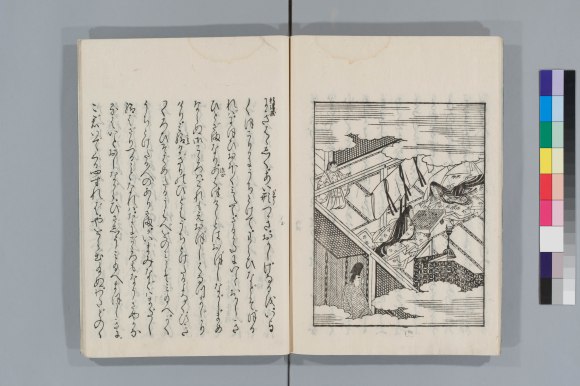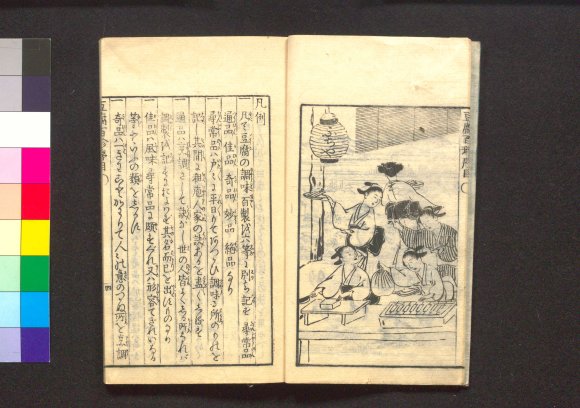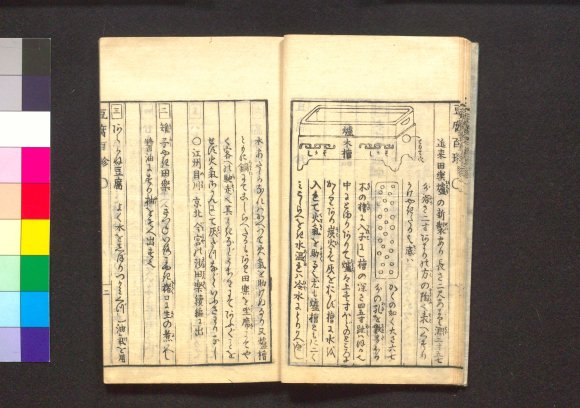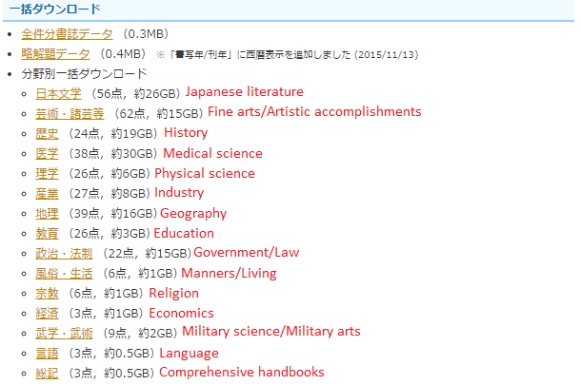
Who doesn’t love getting a free book? Especially when that book is over 300 years old!
The National Institute of Japanese Literature, in conjunction with the National Institute of Informatics, has released a free pilot version of a database of digitized versions of ancient Japanese written works. The collection includes invaluable literary classics which largely date from the Edo period (1603-1868) of Japanese history, including a 17th century copy of The Tale of Genji, written by noble lady-in-waiting Murasaki Shikibu in the 11th century and largely recognized as the world’s first novel, to the 1782 Tofu Hyakuchin recipe book.
▼ Extracts from a 54-volume 1654 copy of The Tale of Genji
▼ Extracts from a 1782 copy of Tofu Hyakuchin
The release comes as part of the National Institute of Japanese Literature’s efforts to digitize its archive of approximately 300,000 rare literary works integral to Japanese literary culture. This first “Version 0.1” pilot database (which can be found here) was made available to the public beginning in November of last year, and currently houses files for approximately 350 total works, all of which contain compressed JPEG photo files and may also include bibliographic, reprint, and tag data in text format. In addition, five of the files come with typed transcripts of the full body text for ease of modern reading.
The National Institute of Informatics has organized the downloadable data on their website into 15 categories based on field of study. The largest individual category is marked as “Japanese literature,” which includes 56 works weighing in at 26 GB. At present, this information is available only in Japanese, so please use our handy index guide below to identify your interests:
Besides its nonexistent price tag, the beauty of the database is that you can download individual works, works in bulk by category, or even the entire collection at once–though you should check to make sure that you have enough space to store a staggering 141 GB worth of data beforehand! Even if they can’t read Japanese, bibliophiles around the world are sure to delight in this archival treasure.
Source: Japaaan Magazine
Images: National Institute of Informatics (edited by RocketNews24)





 Embrace the literary and the historical with traditional Japanese artwork as your Zoom background
Embrace the literary and the historical with traditional Japanese artwork as your Zoom background Cosplayers rejoice! Robot mannequin transforms to any body size/shape with the click of a button
Cosplayers rejoice! Robot mannequin transforms to any body size/shape with the click of a button Japanese invention lets you share your baby’s bowel movements online with the push of a button
Japanese invention lets you share your baby’s bowel movements online with the push of a button New Philippine mail order site makes Japanese items available at the click of a button
New Philippine mail order site makes Japanese items available at the click of a button National Film Archive of Japan releases shocking historical videos of 1923 Great Kanto Earthquake
National Film Archive of Japan releases shocking historical videos of 1923 Great Kanto Earthquake Japan’s new difficult-to-drink-from beer glass protects your liver, but it’s a brutal experience
Japan’s new difficult-to-drink-from beer glass protects your liver, but it’s a brutal experience Demon Slayer: Kimetsu no Yaiba gets new roller coaster attractions and food at Universal Studios Japan
Demon Slayer: Kimetsu no Yaiba gets new roller coaster attractions and food at Universal Studios Japan How to order snacks on a Shinkansen bullet train in Japan
How to order snacks on a Shinkansen bullet train in Japan New samurai glasses are Japan’s latest weird must-have souvenir
New samurai glasses are Japan’s latest weird must-have souvenir Hello, cosmetics! Clinique teams up with Hello Kitty this summer for first-time collaboration
Hello, cosmetics! Clinique teams up with Hello Kitty this summer for first-time collaboration High-fashion Totoro cuddle purse is like an elegant stroll in the forest【Photos】
High-fashion Totoro cuddle purse is like an elegant stroll in the forest【Photos】 Burger King Japan suddenly adds Dr. Pepper and Dr. Pepper floats to its menu nationwide
Burger King Japan suddenly adds Dr. Pepper and Dr. Pepper floats to its menu nationwide New Nintendo Lego kit is a beautiful piece of moving pixel art of Mario and Yoshi【Photos】
New Nintendo Lego kit is a beautiful piece of moving pixel art of Mario and Yoshi【Photos】 Japan’s cooling body wipe sheets want to help you beat the heat, but which work and which don’t?
Japan’s cooling body wipe sheets want to help you beat the heat, but which work and which don’t? Nintendo history you can feel – Super NES, N64, and GameCube controllers become capsule toys
Nintendo history you can feel – Super NES, N64, and GameCube controllers become capsule toys “The most Delicious Cup Noodle in history” – Japan’s French Cup Noodle wins our heart【Taste test】
“The most Delicious Cup Noodle in history” – Japan’s French Cup Noodle wins our heart【Taste test】 Starbucks releases a cute Frappuccino and Unicorn Cake…but not in Japan
Starbucks releases a cute Frappuccino and Unicorn Cake…but not in Japan Kyoto Tower mascot termination reveals dark side behind cute Japanese characters
Kyoto Tower mascot termination reveals dark side behind cute Japanese characters McDonald’s Japan’s Soft Twist Tower: A phantom ice cream only sold at select branches
McDonald’s Japan’s Soft Twist Tower: A phantom ice cream only sold at select branches Yabai Ramen: What makes this Japanese ramen so dangerous?
Yabai Ramen: What makes this Japanese ramen so dangerous? Finally! Nintendo Japan expands Switch 8-bit controller sales to everybody, Online member or not
Finally! Nintendo Japan expands Switch 8-bit controller sales to everybody, Online member or not Japanese government wants to build luxury resorts in all national parks for foreign tourists
Japanese government wants to build luxury resorts in all national parks for foreign tourists To combat declining birth rate, Japan to begin offering “Breeding Visas” to foreigners
To combat declining birth rate, Japan to begin offering “Breeding Visas” to foreigners 10 things you should buy at 7-Eleven in Japan
10 things you should buy at 7-Eleven in Japan Studio Ghibli releases anime heroine cosplay dresses that are super comfy to wear
Studio Ghibli releases anime heroine cosplay dresses that are super comfy to wear Woman charged for driving suitcase without a license in Osaka
Woman charged for driving suitcase without a license in Osaka Studio Ghibli unveils My Neighbour Totoro miniature house model
Studio Ghibli unveils My Neighbour Totoro miniature house model Kyoto experiencing problems with foreign tourists not paying for bus fares, but not on purpose
Kyoto experiencing problems with foreign tourists not paying for bus fares, but not on purpose Fighting mild hunger with a Japanese soda that turns into jelly in the stomach【Taste test】
Fighting mild hunger with a Japanese soda that turns into jelly in the stomach【Taste test】 Studio Ghibli’s Howl’s Moving Castle tapestry unveiled in Japan for first time
Studio Ghibli’s Howl’s Moving Castle tapestry unveiled in Japan for first time McDonald’s new Happy Meals offer up cute and practical Sanrio lifestyle goods
McDonald’s new Happy Meals offer up cute and practical Sanrio lifestyle goods Sales of Japan’s most convenient train ticket/shopping payment cards suspended indefinitely
Sales of Japan’s most convenient train ticket/shopping payment cards suspended indefinitely Sold-out Studio Ghibli desktop humidifiers are back so Totoro can help you through the dry season
Sold-out Studio Ghibli desktop humidifiers are back so Totoro can help you through the dry season Japanese government to make first change to romanization spelling rules since the 1950s
Japanese government to make first change to romanization spelling rules since the 1950s Foreigner’s request for help in Tokyo makes us sad for the state of society
Foreigner’s request for help in Tokyo makes us sad for the state of society Ghibli founders Toshio Suzuki and Hayao Miyazaki contribute to Japanese whisky Totoro label design
Ghibli founders Toshio Suzuki and Hayao Miyazaki contribute to Japanese whisky Totoro label design Doraemon found buried at sea as scene from 1993 anime becomes real life【Photos】
Doraemon found buried at sea as scene from 1993 anime becomes real life【Photos】 Tokyo’s most famous Starbucks is closed
Tokyo’s most famous Starbucks is closed Princesses, fruits, and blacksmiths: Study reveals the 30 most unusual family names in Japan
Princesses, fruits, and blacksmiths: Study reveals the 30 most unusual family names in Japan All of Tokyo available as a free 3-D scale model right now!
All of Tokyo available as a free 3-D scale model right now! Government form allows Japanese romantics to officially declare their love
Government form allows Japanese romantics to officially declare their love Work-in-progress Japanese AI program could probably get into 474 universities in the country
Work-in-progress Japanese AI program could probably get into 474 universities in the country Public high school in Japan’s Gifu Prefecture will no longer take student absences into account for entrance applications
Public high school in Japan’s Gifu Prefecture will no longer take student absences into account for entrance applications Foreigners can now apply for visas to visit fiancés living in Japan
Foreigners can now apply for visas to visit fiancés living in Japan What colors of clothing will keep you cooler in summer? Japanese researchers experiment
What colors of clothing will keep you cooler in summer? Japanese researchers experiment Lotteria serves up Shinkansen H5 Series Set to mark inaugural bullet train service to Hokkaido
Lotteria serves up Shinkansen H5 Series Set to mark inaugural bullet train service to Hokkaido The top 10 universities in Japan determined by 2021 World University Rankings
The top 10 universities in Japan determined by 2021 World University Rankings City of Kyoto advertises the charms of living in Japan’s ancient capital using a cute tabby cat
City of Kyoto advertises the charms of living in Japan’s ancient capital using a cute tabby cat Edo and Meiji era Japanese artwork now available for free download 【Pics】
Edo and Meiji era Japanese artwork now available for free download 【Pics】 Revolutionary A.I. voice software produces incredible vocals that sound just like a real human
Revolutionary A.I. voice software produces incredible vocals that sound just like a real human Protect your fingers with these adorable rubber thimbles based off ancient Japanese clay dolls
Protect your fingers with these adorable rubber thimbles based off ancient Japanese clay dolls HALOP: The Japanese huggy pillow for people who already have a human boyfriend/girlfriend
HALOP: The Japanese huggy pillow for people who already have a human boyfriend/girlfriend Edo-era illustrated records show the disasters that have plagued Japan throughout its history
Edo-era illustrated records show the disasters that have plagued Japan throughout its history Emperors, anime icons, and porn stars show up in six-nation survey of most famous Japanese people
Emperors, anime icons, and porn stars show up in six-nation survey of most famous Japanese people Akashi Brewery is now offering “Moe Beer” for your thirst-quenching, otaku needs
Akashi Brewery is now offering “Moe Beer” for your thirst-quenching, otaku needs Stylish new Experience Japan Pictograms are here to enhance your Japan travels and knowledge
Stylish new Experience Japan Pictograms are here to enhance your Japan travels and knowledge
Leave a Reply